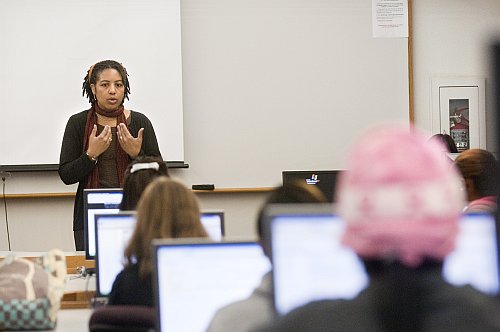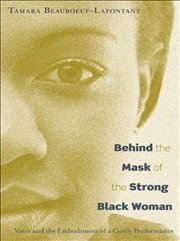Professor Tamara Beauboeuf
October 14, 2010
Associate Professor of Education Studies and Sociology Tamara M. Beauboeuf would probably tell you not to judge a book by its cover. After all, she spent the last decade examining the truth behind a seemingly benign stereotype. The thing is, had Beauboeuf not broken that rule one day, her career might have turned out much differently.
A graduate student at the time, Beauboeuf was walking through her university's bookstore when a book in the women's studies section caught her attention.
"It had a cover that captivated me," Beauboeuf recalls. "I bought it, read it and decided that I wanted to study with this person."
The author was Carol Gilligan, a professor at the Harvard Graduate School of Education. Her work fascinated Beauboeuf. Both studied English literature in college, and Gilligan had used that background to inform her research in human development.
"[Gilligan] had a sensitivity that you get from being exposed to literature, realizing that people are complex and nuanced," Beauboeuf says. "She saw that this was a huge gap in the social sciences that people weren't recognizing, and she was trying to fill that gap not only empirically, but also by looking at what women had written about their own lives.
"I had gotten to a point in my studies where I loved literature, but I wanted to know whether the observations these authors were making were true. They were interesting, but could we really use them to make statements about social reality?"

That question continued to form the basis of Beauboeuf's scholarship after she earned her doctorate. In the late 1990s, she started to recognize a pattern in the way that black women were being described, both in literature and the social sciences. They weren't being portrayed negatively – quite the opposite, the Strong Black Woman was a pillar of the African-American community.
"Everybody wants a strong black woman around them," Beauboeuf says. "If you have a strong black woman in your family, she's going to do everything she can to care for others. At her job, she'll do twice the amount of work as anybody else and not complain about it. As a spouse, you can do whatever you want to do to her, and she'll be forgiving. But who would want to sign up for this?
"I thought that this idea of black women being invulnerable, super-capable, independent and incredibly gifted at caring for others was perhaps not the truth. It's a very reassuring fiction to believe that people who have gone through hell haven't been scarred by that experience, but I was hearing from enough sources that women who had this experience would say it is an incomplete picture."
She began to examine why so much had been invested in this particular formulation of a black woman's goodness. Through extensive interviews with dozens of black women over a 10-year period, Beauboeuf found that adherence to the strong black woman archetype often inflicted physical and emotional tolls on women in the form of depression and eating disorders.
 "These women were very cognizant of the fact that there were great costs to this behavior," Beauboeuf says. "They kept using words such as 'performance' and 'façade,' and felt as if they were actresses. They were also forthcoming about the fact that they experienced a lot of emotions they couldn't express because you can't be vulnerable when you're a strong black woman."
"These women were very cognizant of the fact that there were great costs to this behavior," Beauboeuf says. "They kept using words such as 'performance' and 'façade,' and felt as if they were actresses. They were also forthcoming about the fact that they experienced a lot of emotions they couldn't express because you can't be vulnerable when you're a strong black woman."
Beauboeuf recounted these interviews in her 2009 book, Behind the Mask of the Strong Black Woman. In it, her research is never too distant from the real lives of the women she got to know.
"The best scholarship helps you to hover above your own experience and see things in a different way, but not in a way that prevents you from seeing the people on the ground," Beauboeuf says. "I've gotten letters from people who have said, 'This book helped me understand myself.'"
